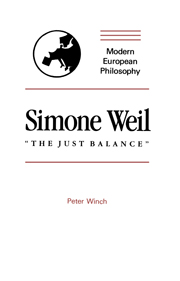Book contents
- Frontmatter
- Contents
- Acknowledgements
- 1 Introduction
- 2 The Cartesian background
- 3 The sensations of the present moment
- 4 “La simple perception de la nature est une sorte de danse”
- 5 Language
- 6 Necessity
- 7 Equilibrium
- 8 “Completely free action”
- 9 The power to refuse
- 10 “The void”
- 11 Geometry
- 12 Incommensurability
- 13 Beauty
- 14 Justice
- 15 “A supernatural virtue”?
- Notes
- Bibliography
- Index
- Frontmatter
- Contents
- Acknowledgements
- 1 Introduction
- 2 The Cartesian background
- 3 The sensations of the present moment
- 4 “La simple perception de la nature est une sorte de danse”
- 5 Language
- 6 Necessity
- 7 Equilibrium
- 8 “Completely free action”
- 9 The power to refuse
- 10 “The void”
- 11 Geometry
- 12 Incommensurability
- 13 Beauty
- 14 Justice
- 15 “A supernatural virtue”?
- Notes
- Bibliography
- Index
Summary
The secret of the human condition is that equilibrium between man and the surrounding forces of nature “which infinitely surpass him” cannot be achieved by inaction; it is only achieved in the action by which man recreates his own life: that is to say by work.
This overall conception of human life is filled out in the section called “Analysis of Oppression” in the main essay of Oppression and Liberty, “Reflections Concerning the Causes of Liberty and Social Oppression.” The phrase “which infinitely surpass him” is a quotation from Spinoza, and “by which man recreates his own life” echoes Marx. Both writers heavily influenced this essay. There is much fundamental criticism of Marx in it, but also acknowledgement of the debt owed him.
The notebook entry speaks of “an equilibrium between man and the surrounding forces of nature.” The concept of equilibrium was very important to Simone Weil at all stages of her thinking. Her view of how the equilibrium between people and their environment is to be understood changed a good deal as time went on, but I think it is possible, and desirable at this stage, to say something in general about what she meant by this term.
Roughly speaking, x and y are in equilibrium when they are in stable relations with each other of a sort which permits each to retain its own essential nature. It follows that what is to count as equilibrium in any given case will be internally related to how we understand the essential natures of the entities involved. I express myself with some caution here.
- Type
- Chapter
- Information
- Simone Weil: "The Just Balance" , pp. 77 - 89Publisher: Cambridge University PressPrint publication year: 1989



